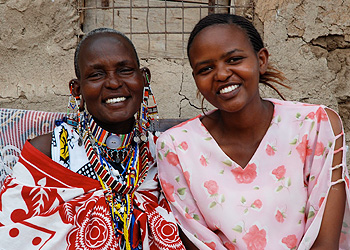 MGEF scholarships, workshops, and community partnerships are empowering women and promising a better future for all Maasai. The MGEF scholarship program offers every student an opportunity to attend vocational school, college or university, as their interest and ability allow. The MGEF alumni are educated and employed. They are helping their families and communities, and they are role models in a world where there are few educated women. They are shown great respect in their communities, and even the status of their families has risen because they have an educated daughter who helps her family and community. The workshops are helping girls to stay in school by addressing barriers to education, such as teen pregnancy, early marriage, FGM, and the spread of HIV. Our community partnership is helping to build an independent organization in Kenya that will in time be able to support itself.
MGEF scholarships, workshops, and community partnerships are empowering women and promising a better future for all Maasai. The MGEF scholarship program offers every student an opportunity to attend vocational school, college or university, as their interest and ability allow. The MGEF alumni are educated and employed. They are helping their families and communities, and they are role models in a world where there are few educated women. They are shown great respect in their communities, and even the status of their families has risen because they have an educated daughter who helps her family and community. The workshops are helping girls to stay in school by addressing barriers to education, such as teen pregnancy, early marriage, FGM, and the spread of HIV. Our community partnership is helping to build an independent organization in Kenya that will in time be able to support itself.
Changing attitudes toward educating girls
Simantoi Kilama’s father was adamantly opposed to educating girls and refused to contribute toward the cost of his daughter’s education, but Simantoi persisted, attending classes about one-third of the time, as that was all her mother could afford by selling charcoal and asking for contributions from friends. MGEF supported Simantoi’s secondary and college education, and beginning in 2006 she was employed as a nurse at a clinic in Nairobi while pursuing a degree in psychology at the University of Nairobi. In 2011, she graduated from her program and is currently serving as an HIV/AIDS Counselor at the University of Nairobi. Simantoi is economically independent, but she has not forgotten her home. She contributes more to her family every year than her dowry would have brought. She pays their medical bills, buys shoes and school uniforms for her nieces and nephews. She also purchases food for her parents, and more. Her family is healthier and economically stronger, and they are now revered in the community for having an educated, successful daughter, whom her father readily brags about. Simantoi and her mother have changed the way her father and their entire community view girls’ education. Now everyone wants an educated daughter “like Simantoi.” Incredibly, every girl in her family is now in school.
Challenging ethnic prejudices
Caroline Kashinin graduated from the Kenya Medical Training College in 2008 and has since been working as a nurse in a clinic near her home in southern Kenya. When members of the community come to the clinic, they speak to Caroline in Kiswahili because they have never seen a Maasai professional and assume she is from another tribe. They are shocked when she responds in Maa, and their long-held prejudices are turning to pride. Caroline, like Simantoi, contributes to her family’s basic needs, and even built a better home for her mother. Caroline has a brother who has been employed for years in Nairobi, but the brother has never contributed anything to his family.
Addressing myths about female circumcision (female genital mutilation)
MGEF workshops for girls are teaching, among other things, the facts and physiological consequences of FGM. The girls who attend these workshops denounce the practice and vow never to circumcise their daughters. One girl wrote “I am going to tell my parents that what they did to me was bad.” We may not be able to prevent this practice for this generation, but this generation will end it.
Empowering the community
MGEF is successful because of the tireless efforts of our partner organization in Kenya. Staff and board training have given the 56 volunteer women and chiefs the skills to run a successful organization, which is respected throughout Kenya’s Maasailand. MGEF is known in Kenya as a “sponsorship program that works well,” and the women and men who work with MGEF are respected for their contribution toward helping the Maasai people.
